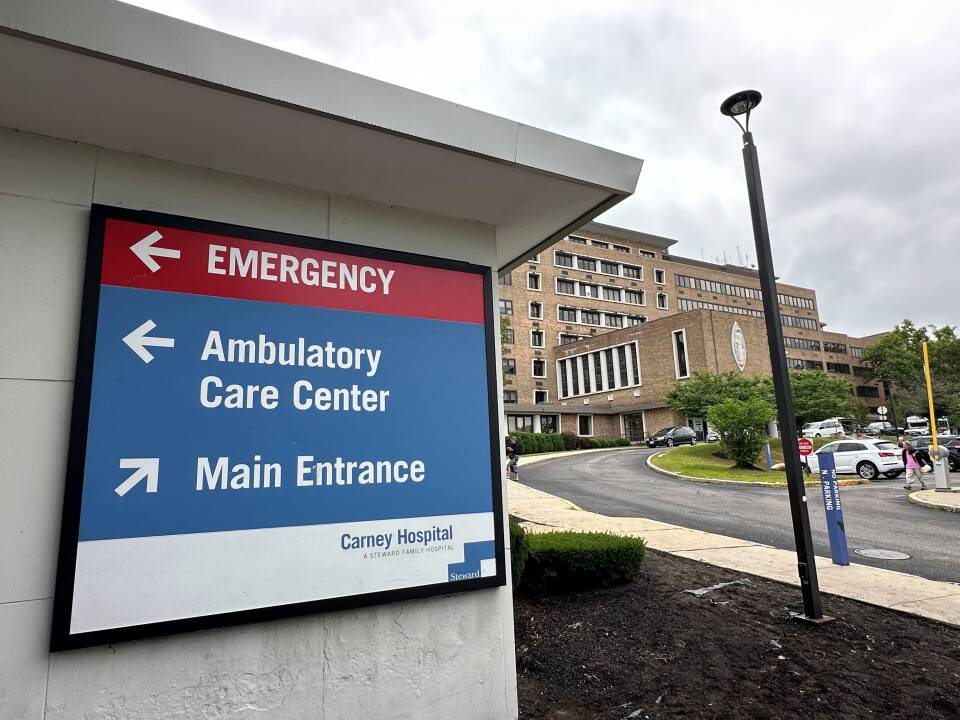Steward Healthcare was once a titan in the healthcare industry. Now, it’s bankrupt — critics might add “morally bankrupt” as well. Hospitals are closing their doors. Workers are uncertain of their future. And, new reporting from the Globe finds, patients’ lives are at risk.
This all happened under CEO Ralph de la Torre’s leadership. Under his watch, Steward Health Care amassed a staggering amount of debt. Report after report has revealed de la Torre’s operational failures and mounting financial losses — all while enriching himself with multimillion-dollar apartments, yachts, luxury vacations and more.
New reporting from the Boston Globe’s Spotlight team is exposing just how dubious the CEO’s financial dealings were.
Spotlight reporter Hanna Krueger joined GBH’s All Things Considered host Arun Rath to detail how mismanagement at the top led to the company’s downfall. What follows is a lightly edited transcript.
Arun Rath: Your reporting starts with just one example of how de la Torre used Steward funds for his own benefit. In this case, it’s about a $10 million donation to a school — which sounds wonderful. But at this point, Steward’s already in financial trouble, and there’s more to that than it sounds. Could you give us some more detail on that context there?
Hanna Krueger: Yeah. So, just to frame this, Steward was in deep financial distress at this point. Of course, that wasn’t terribly transparent to people on the outside, but Steward itself knew that, and the vendors who weren’t being paid knew that.
We have a scene in the story where there’s a financial executive of a vendor sitting in the parking lot outside a hospital emailing Ralph and other executives on the Steward team and just begging for the bill that is outstanding to his company to be paid.
And then, fast forward two months from then — you have Ralph de la Torre standing at a podium at this children’s K-12 prep school just outside Dallas, and he’s parading this $10 million donation in his mother’s name to build a STEM center.
Like you said, that’s great. Philanthropy is great. However, the bankruptcy filing shows that at least $3 million of that donation came from Steward itself, which means this company — which is meant to serve low-income communities and was just in great financial duress — was being used to prop up the personal reputation of its CEO.
[Editor’s note: Steward Health Care declined to comment to GBH News, and declined to comment for the Globe’s story. A personal spokesperson for de la Torre did not respond to the Globe’s requests for comment, and the CEO didn’t respond to the Globe’s messages sent to his personal or company email accounts.]
Rath: The whole sort of narrative of not just this piece but the range of pieces in this investigation, it seems like it starts off with [de la Torre] coming from a good place originally. At what point in the timeline did the financial dealings head south?
Krueger: I mean, yeah, like you said, the Steward model was a titan in the healthc are industry. It presented, potentially, a new frontier. I think we’ve seen now that — at least the way that Steward handled it — is not feasible. It’s not durable. And in many ways, it was corrupt.
I mean, in 2021, I think the company was already reporting over $300 million in losses; in 2022, it was $200 million in losses. And then, obviously, this May, they have now filed a $9 billion bankruptcy suit.
The company just fell downwards. It expanded rapidly in the early 2010s and went across the U.S. and into Malta and Colombia. But, now, it is folding in on itself, and it’s being presented — a bit — as a house of cards. And the one person who seems to [have] been unscathed by all this financial trouble is the CEO.
Rath: You mentioned how vendors knew something was going wrong [because] they weren’t getting paid. There must have been other signs. How did this go unnoticed for so long?
Krueger: I mean, it’s a good question, and I think it’s something that the Spotlight team is focusing on in our future stories, as well. But there should have been — and could have been — more accountability for Steward in any of the states that it operates. [Steward] federally received CARES Act money.
I think it’s just a lesson in how we let for-profit health care systems run unchecked, and now, we are realizing the dire consequences of that. We’ve had reporting that shows patients who have suffered, and one woman who died because a Steward hospital didn’t have the necessary equipment to save her life.
There are millions of dollars in lawsuits against Steward by small-time vendors that just weren’t paid. And, as we also know, we’re slated to lose something like 1,200 jobs in Massachusetts alone. Then, multiply that across the United States, where they have over 30 hospitals in several states.
The consequences are catastrophic, and it is a good question to ask why this was let to happen.
Rath: Talking about questions unanswered — de la Torre is refusing to go before a Senate committee at a hearing next week. What’s your reaction to that and your sense of what consequences there could be for him and for Steward?
Krueger: Yeah. I mean, I wish I could say I’m surprised, but having been in de la Torre’s world for the past few months, this was an outcome that I expected. He’s obstinate and clearly, as the self-dealing shows, has himself at top-of-mind, and it didn’t come as a great surprise that he would fight back against this Congressional subpoena.
I think he knows what they’ll do, which is, in part, point to reporting like ours, and those jets that everybody’s seen, and the boats that everybody has seen — these multimillion-dollar assets that allowed him to live a lavish, luxurious lifestyle while his hospitals crumbled and failed. I think he is avoiding that spotlight because it would not be a good look for him.
What will happen? I guess it depends on how strong the members of the health committee want to be. They could hold him in contempt; I don’t know if they will. They’ve said a lot of words, but it will be up to those senators as to whether or not they’ll take action on this.
“This was in plain sight. That’s public data, and it’s interesting to see why the board of directors and politicians didn’t pay attention earlier.”Hanna Krueger, Boston Globe Spotlight reporter
Rath: This is a question that you can’t really fairly answer, but I’ll ask it anyway. There are a lot of for-profit health care companies in America. You just have to wonder how many other Steward Health Cares might be out there since this went undiscovered for so long.
Krueger: Yeah. I mean, I think we can learn a lot from what happened with Steward and why what happened with Steward was allowed to happen. It very well might be a phenomenon that infects a lot of for-profit healthcare systems.
I will say that, while private executives do enjoy a considerable amount of latitude in compensation, travel and spending, there were lines that were crossed here — and it could have fallen on the board of directors to keep de la Torre in check. In fact, that’s one of the only entities that could have done it.
But instead, he was left to just treat Steward’s bank accounts as his personal piggy bank. We document one example where he used the Steward money to purchase an €8 million apartment in Madrid — and then also pay for the renovations on the Steward dollar. And then the story also outlines jet travel that goes back and forth to Costa Rica something like 80 times over the course of three years. I needn’t tell you: There’s no hospitals or official operations for Steward in that country.
This was in plain sight. That’s public data, and it’s interesting to see why the board of directors and politicians didn’t pay attention earlier.









